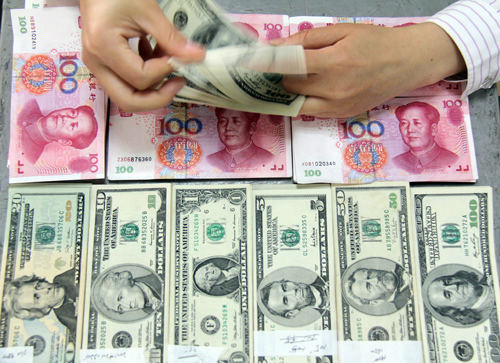|
In October, the Ministry of Finance started a pilot program allowing local governments in Shanghai and Shenzhen and Zhejiang and Guangdong provinces to issue bonds. It is the first time that local governments have been allowed to issue bonds.
The Central Government ordered that bonds of the four local governments should not exceed 22.9 billion yuan ($3.61 billion) in 2011.
This move is expected to ease their financial strains and curb fast-spreading risks of local government debt. According to the National Audit Office, local government debt totaled about 10.7 trillion yuan ($1.69 trillion) at the end of 2010, accounting for 27 percent of the GDP in 2010.
 |
|
A bank clerk in Shandong Province counts renminbi and dollar notes (CFP) |
This year China has been stepping up its efforts to globalize its currency, called the renminbi or yuan.
On January 14 the central bank's No.1 document of the year was devoted to allowing the country's qualified businesses and banks to settle their overseas direct investment in the yuan. This is considered a move that expands the Chinese currency's global reach from international trade settlement to investment settlement.
On October 12 the People's Bank of China, the central bank, issued regulations about foreign direct investment (FDI) settled in the yuan, another move aiming at promoting cross-border use of the yuan. Within two months, China has approved 16.5 billion worth yuan-denominated FDI.
On December 16 the China Securities Regulatory Commission, the People's Bank of China and the State Administration of Foreign Exchange jointly issued rules for pilot programs of RMB Qualified Foreign Institutional Investors, formally giving the green light to investment of overseas renminbi funds at mainland securities markets.
Hong Kong subsidiaries of fund management companies and securities firms can use renminbi funds raised in Hong Kong to invest in mainland securities within a permitted quota, according to the rules.
Meanwhile, the yuan exchange rate has been increasingly driven by market demand. As of November 4, when the yuan strengthened to 6.3165 against the U.S. dollar, the yuan had appreciated 4.6 percent against the U.S. dollar this year. But from November 30 the yuan had weakened for 12 consecutive trading days. The fluctuations indicate that the exchange rate of the yuan is responsive to market demand and is not being manipulated by the government.
On January 26, the State Council announced the toughest-ever measures to tame the sizzling housing market. Besides setting property price-control targets, increasing the supply of affordable housing and public rental housing, increasing land supply and stricter tax measures, the toughest measure was home purchase limits in large cities or cities where housing prices are high or rise very fast.
On July 12 the State Council required cities that had already implemented home purchase limits to continue to carry out related policies, while second- and third-tier cities whose home prices increased rapidly must carry out necessary policies to limit home purchases.
As 2011 comes to a close, purchase limits are taking effect, as the housing market has been rife with mounting inventory, plummeting prices and sluggish sales. According to the National Bureau of Statistics, 49 cities out of 70 major cities saw month-on-month drops in new home prices in November, compared with 34 cities in October.
Premier Wen Jiabao said in November the property market control measures will remain in force to let the property prices fall to a reasonable level.
Many cities including Beijing and Shanghai have announced that the home purchase limit will continue in 2012.
| 